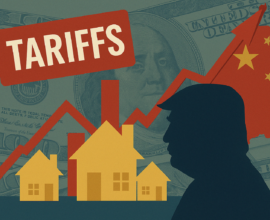Is the 2023 Housing Market at a Crossroads?
With home prices having gone up nearly 80% in the past 10 years, it’s natural to wonder if the housing market is due for a correction. After all, real estate tends to follow cycles. Are we on the brink of another market collapse waiting to happen? Read on to find out!
U.S. Home Prices Peaked in June 2022
According to the Case-Shiller Home Price Index, which measures the change in the value of the U.S. residential housing market, home prices topped out in June 2022. The median sale price reached an all-time high of $468,000. This came after two years of rapid growth in home prices starting in March 2020, in which home prices soared by over 40%.
But just because today’s housing market is different from that of 2008 doesn’t mean a crash couldn’t still be on the horizon.
However, the real estate bull market stretches back to 2012, when the 2008 housing crash bottomed out. That’s a long time. Many first-time homebuyers have never experienced a real housing downturn as an adult until now.
Home prices have been declining for five straight months, which is the longest period of decline since the Great Recession. Still, home values are way above pre-pandemic levels. To drop that far would indicate that we’ve been in a housing bubble that’s burst.
Who Sets House Prices Anyway?
To understand if we’re at the start of another housing crash, it’s important to understand how housing prices are set in the first place.
Sellers aren’t the price setters. In fact, they are usually the last to move on home prices, especially during downturns because they want to hold onto old perceptions of what their home is worth.
The real price setters are property builders. These are mostly large corporations that carefully track housing supply and demand to avoid oversupplying the market so much that home values start to fall, and they are forced to sell at a lower price.
U.S. home builders have been cutting their prices and offering buyer incentives since last July and haven’t stopped since. And because new homes tend to anchor prices, the existing housing inventory will most likely follow suit (as we’re starting to see).
Once builders start to lower their prices, it takes a while for the price changes to flow throughout the entire market, so this could be the start of a long bear market.
How Major Housing Crashes Start
The real question is how long the current decline in home prices will last. The short answer is that nobody knows for sure. But if history is any indication, most housing recessions begin at a gradual pace. It’s not something that happens overnight.
Take the 2008 housing crash, for instance. If you look at the Case-Shiller index, you’ll see that it took about five years for home values to bottom out and another five for them to recover to where they were pre-crash, making the entire recession last about 10 years.
Once builders start to lower their prices, it takes a while for the price changes to flow throughout the entire market, so this could be the start of a long bear market.
But Is This Time Different From 2008?
Of course, the housing market looks much different today than it did in 2008.
Unlike in 2008, lending practices are much stricter with fewer underqualified borrowers getting risky adjustable-rate mortgages (ARMs). Plus, most current homeowners have their mortgage rates locked in, often at below 5%, which means they’re unlikely to default on their loans and set off a foreclosure crisis.
In addition, the U.S. housing inventory is too low to sustain a large drop in prices. While inventory reached an all-time high in July 2007 right before the 2008 crash, we’re currently in a housing shortage that reached its worst in January 2022. That means there are too few homes to meet demand, which puts upward, not downward, pressure on home prices.
But just because today’s housing market is different from that of 2008 doesn’t mean a crash couldn’t still be on the horizon.
In short, recent high home values may have been inflated due to investor speculation.
Recent Investor Speculation in the Housing Market
One reason for concern is that investors bought up a record number of residential homes in the past few years. According to Pew Charitable Trusts, investors bought 24% of all single-family homes (SFHs) sold in 2021, up from 15% to 16% annually since 2012. That share only dipped slightly in the first five months of 2022 to 22%.
What this means is that, just like in 2008, there’s been a lot of speculation in the real estate market, which could help explain the recent high home prices. And the share of investors buying single-family homes cited above doesn’t even account for small investors, many of whom can get regular homeowner mortgages for a lower interest rate and down payment through loopholes like house hacking. How? By allowing them to get consumer mortgages as opposed to commercial loans. The latter usually have higher mortgage rates because investor-owned properties tend to present a higher risk to lenders than do owner-occupied properties (you’re less likely to default on your mortgage if you live in the house it pays for).
In short, recent high home values may have been inflated due to investor speculation. Even if investors bought the same number (or fewer) SFHs than in previous years, the fact that they’ve increased their share of SFH purchases going back to 2012 means regular homeowners’ share of SFH purchases has been decreasing, and the relative amount of investor speculation may be going up.
Even if home values drop at a more modest rate than they did in 2008, the looming housing recession shows all the signs of being long and painful for overleveraged homeowners.
Something in the Housing Market Has to Give
The U.S. housing market is at a crossroads. Home prices cannot continue to stay high with housing affordability at its lowest level in history. According to the Pew Research Center, 46% of American renters spent 30% or more of their income on housing, including 23% who spent at least 50% of their income this way (30% or less is considered affordable).
When you consider our low 3.4% unemployment rate, the expected decrease in nominal wage growth, and the continued expected interest rate hikes by the Federal Reserve to fight rising inflation, it leaves one variable: prices. Home prices must significantly drop for housing supply and demand to rebalance. The current trajectory simply cannot continue.
As a result, the evidence is strong that the recent decline in U.S. home prices could mark the start of a long bear market.
Of course, there’s no telling how fast prices will drop. If you look at the Covid price run-up in most markets, the 20%+ growth is 15% above a typical market growth cycle and one can easily assume prices can and should back off to a normalized level once the housing inventory stabilizes (though these numbers would need to be adjusted for the inflation that has occurred since then).
Even if home values drop at a more modest rate than they did in 2008, the looming housing recession shows all the signs of being long and painful for overleveraged homeowners.
As a real estate investor, the best thing you can do is to analyze deals carefully so that you don’t end up with an underwater mortgage or a property you don’t want. Even in a bear market, you can still find great deals if you know where to look. Try out the PropertyOnion.com property search map to find your next distressed property today!








